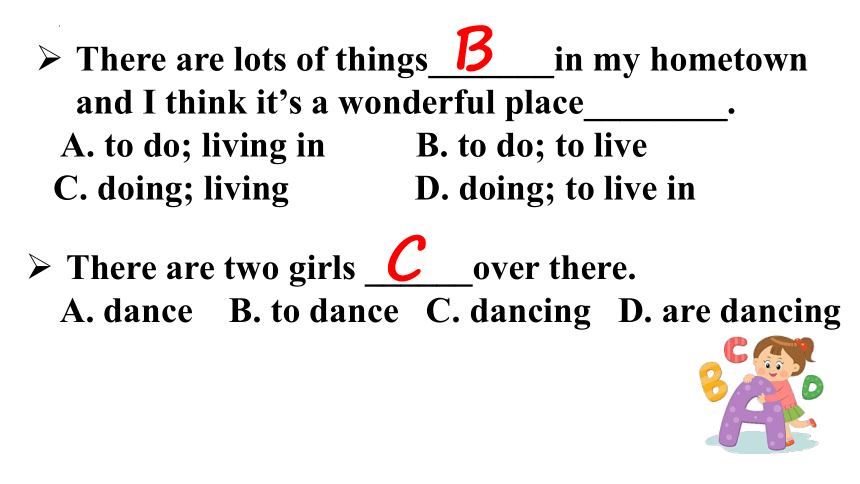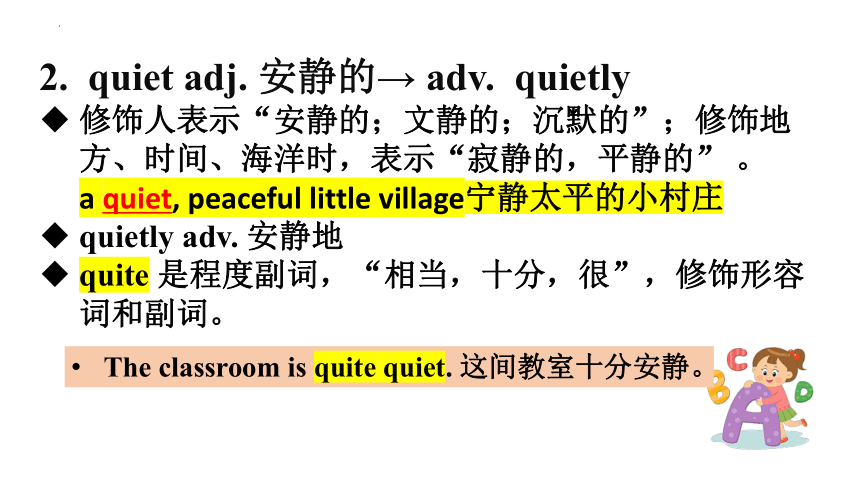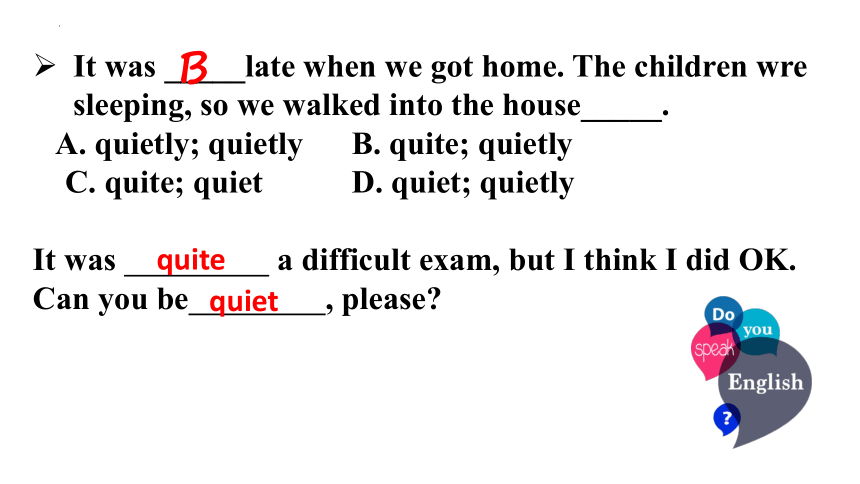Unit 3 Welcome to Sunshine Town Reading 2课件
文档属性
| 名称 | Unit 3 Welcome to Sunshine Town Reading 2课件 |

|
|
| 格式 | pptx | ||
| 文件大小 | 6.3MB | ||
| 资源类型 | 试卷 | ||
| 版本资源 | 牛津译林版 | ||
| 科目 | 英语 | ||
| 更新时间 | 2024-03-06 16:03:49 | ||
图片预览









文档简介
(共23张PPT)
Welcome to Sunshine Town
A great new town
Reading 2
What's special about Sunshine Town
There are lots of things to do in Sunshine Town.
stay in a quiet town
eat Chinese food
go
shopping
enjoy Beijing opera
There is/are +名词+ to do… “有…可做”
动词不定式后置定语,做后置定语,两者存在逻辑上的动宾关系,表示“即将要做的事”。
There is/are +名词+ v.-ing 前面的名词与动词的-ing形式是主动关系,表示“正在发生的事情或进行的动作”。
There are many great places to visit in China. 中国有很多可以游玩的好地方。
There are many people walking in the street. 有许多人在街上行走。
Language points
There are lots of things_______in my hometown and I think it’s a wonderful place________.
A. to do; living in B. to do; to live
C. doing; living D. doing; to live in
B
There are two girls ______over there.
A. dance B. to dance C. dancing D. are dancing
C
[练一练]
他有许多书要读。
2. 她没有什么要担心的。
3. 我没有什么房子可以住。
[a lot/a lot of]的区别
(1) a lot 是副词;Thanks a lot 非常感谢; learn/know a lot about sth. 学到/知道很多关于……
(2) lots of = a lot of “许许多多的……”,
加不可数名词 lots of homework = a lot of homework
加可数名词 lots of apples = a lot of apples
He has lots of books to read.
She has nothing to worry about.
I have no house to live in.
2. quiet adj. 安静的→ adv. quietly
修饰人表示“安静的;文静的;沉默的”;修饰地方、时间、海洋时,表示“寂静的,平静的” 。
a quiet, peaceful little village宁静太平的小村庄
quietly adv. 安静地
quite 是程度副词,“相当,十分,很”,修饰形容词和副词。
The classroom is quite quiet. 这间教室十分安静。
It was _____late when we got home. The children wre sleeping, so we walked into the house_____.
A. quietly; quietly B. quite; quietly
C. quite; quiet D. quiet; quietly
It was a difficult exam, but I think I did OK.
Can you be , please
B
quite
quiet
4. air [u] 空气,大气
by air 意为“乘飞机”,air前不加任何限定词
fresh “新鲜的”
多义词,可表示“新鲜的,新的,凉爽的,清新的”
Fresh milk is good for children. 鲜奶对孩子们有益。
Let’s go and get some fresh air. 让我们出去呼吸点新鲜空气吧。
—Your coffee is cold. Let me make you a _____cup.
—Thank you very much.
A. fast B. big C.fresh
C
5. local adj. 当地的,地方性的,本地的
作名词,为“本地人”
This is a local problem, not a nation-wide one.
这是地方性的问题,而非全国性的问题。
I asked one of the locals which way to go.
我问了一位本地人该走哪条路。
6. not far from……离……不远 相当于not far (away) from……
若表示确切距离,要用“be+数字+单位+(away) from”
[1] My mother works in the museum 20 kilometres _____ Suzhou.
A.far away from B.far from C.away D.from
—Is your home far away from you office
—Yes. It’s about 15 miles _____ my home to my office.
A. away from B. far away from C. far from D. far away
[口诀] 表距离,莫要急;数字和far择其一;away省去更省力。
[2] My home is 20 minutes’ walk from the school.[对划线部分提问]
is it from your home to school
How far
D
A
7.花费的几个单词 take; spend; pay; cost
It takes sb sometime to do sth. it为形式主语,
对该句型中的时间提问用how long, how long does it take sb to do….
sb. spend some time (money) on sth.
sb. spend some time (money) doing sth.
[练一练] 我每天要花费二十分钟去学校。(take/spend)
It takes me 20 minutes to go to school every day.
I spend 20 minutes going to school every day.
sb pay (Y) for...
sth. costs (sb.) +some money
1. They spend too much time ______ the report.
A. writing B. to write
C. on writing D. write
2. --What beautiful shoes you’re wearing! They must be expensive.
--No, they only _____10 yuan.
A. spent B. took C. paid D. cost
Practice
A
D
3. --Will you please _____ for my dinner, Peter
-- Sure!
A. spend B. pay C. cost D.take
4. I’m really looking forward to ______ a happy life.
A. live B. lived C. lives D.living
5. It will _____ me too much time to read this book.
A. take B.cost C. spend D.pay
B
D
A
8. by underground 乘地铁
=on the/an underground,在句中做状语
做谓语时要用take an/the underground to….
—Is it far from your home to the workplace
—A little. It is about 20 minutes by___underground
A. a B. an C. the D. /
D
9. famous adj. 著名的,出名的 known about by many people
be famous for… 因为…而出名
be famous as … 作为…而出名
be famous to… 对…而言是出名的
(1)[famous for ]
法国以葡萄酒闻名。
France is famous for its wine.
(2)[famous as+身份]
她是以一名作家而出名。
She is famous as a writer.
The Great Wall is famous to the people all over the world. 长城对于全世界人民来说都很出名。
My hometown, Kunming, is famous____fresh flowers. No matter when you visit it, they will catch your eye.
A. as B. for C. of B. by
B
10. if conj. 如果
主将从现:if引导条件状语从句一般现在时
主句:一般将来时、情态动词、祈使句
Your parents will be happy if you win the game.
If you speak to her, you must speak louder to her.
Don’t play computer games if you don’t finish your homework.
We will go for a picnic if it______rain this Sunday.
A. doesn’t B. won’t C. isn’t D. didn’t
A
11. west n. 西方,西部→western adj. 西方的
east 东;东方→ eastern 东方的
north北;北方→northern 北方的
south 南;南方→ southern南方的
in the east/ west /south/ north of ...
in the eastern/ western/ southern/ northern part of.....
12. Why not do… 用于提出建议
= Why don’t you do..
= How/ What about doing sth..
= Shall we do..
=Let’s do…
13. miss vt. 错过;想念 (三单+es)
to arrive too late to get on a bus, train or aircraft 赶不上,错过
(1)miss sth.错过某事;
She got up late and missed the bus
(2) miss doing sth.错过/想念做某事
I miss living in the country. 我非常怀念乡村的生活。
(3)思念;想念
You don’t know how much I miss you. 你不知道我有多想念你。
If you want to learn more about Chinese art,__________(not miss) the opera shows there.
don’t miss
14. look forward to (doing) sth 期盼(做)某事
The worried mother is looking forward to_________
(hear) from her daughter.
hearing
be/get used to doing sth 习惯于做某事
look forward to doing sth 盼望做某事
pay attention to doing 注意做某事
devote to doing sth. 致力于做某事
make a contribution to doing sth 贡献做某事
to doing 系列
—_____will you finish doing your work
— In a week.
A. How often B. How soon
C. How long D. How far
B
15. soon adv. 很快,不久;(常用于一般将来时)
how soon “多久,多快”, 对“in+一段时间提问”
Mr li is exvited because he will have a long holiday soon.
李先生很兴奋,因为他很快将有一个长假。
—How soon can you finish it 你多久能完成它?
—In a week. 一周后。
visit, by bus, famous for, famous as, look forward to,
why not, miss, take an hour
My hometown Suzhou is a tour city. There are many places of interest . Are you
enjoying the natural beauty
take a walk by Taihu Lake Remember not to
climbing the Tiger Hill, which is its beautiful scenery(风景). It from the city centre to the Tiger Hill.
famous as
to visit
looking forward to
Why not
miss
famous for
takes an hour by bus
语篇运用
Homework:
1. Recite the article of Part Reading fluently.
2. Modify your writing after class..
Welcome to Sunshine Town
A great new town
Reading 2
What's special about Sunshine Town
There are lots of things to do in Sunshine Town.
stay in a quiet town
eat Chinese food
go
shopping
enjoy Beijing opera
There is/are +名词+ to do… “有…可做”
动词不定式后置定语,做后置定语,两者存在逻辑上的动宾关系,表示“即将要做的事”。
There is/are +名词+ v.-ing 前面的名词与动词的-ing形式是主动关系,表示“正在发生的事情或进行的动作”。
There are many great places to visit in China. 中国有很多可以游玩的好地方。
There are many people walking in the street. 有许多人在街上行走。
Language points
There are lots of things_______in my hometown and I think it’s a wonderful place________.
A. to do; living in B. to do; to live
C. doing; living D. doing; to live in
B
There are two girls ______over there.
A. dance B. to dance C. dancing D. are dancing
C
[练一练]
他有许多书要读。
2. 她没有什么要担心的。
3. 我没有什么房子可以住。
[a lot/a lot of]的区别
(1) a lot 是副词;Thanks a lot 非常感谢; learn/know a lot about sth. 学到/知道很多关于……
(2) lots of = a lot of “许许多多的……”,
加不可数名词 lots of homework = a lot of homework
加可数名词 lots of apples = a lot of apples
He has lots of books to read.
She has nothing to worry about.
I have no house to live in.
2. quiet adj. 安静的→ adv. quietly
修饰人表示“安静的;文静的;沉默的”;修饰地方、时间、海洋时,表示“寂静的,平静的” 。
a quiet, peaceful little village宁静太平的小村庄
quietly adv. 安静地
quite 是程度副词,“相当,十分,很”,修饰形容词和副词。
The classroom is quite quiet. 这间教室十分安静。
It was _____late when we got home. The children wre sleeping, so we walked into the house_____.
A. quietly; quietly B. quite; quietly
C. quite; quiet D. quiet; quietly
It was a difficult exam, but I think I did OK.
Can you be , please
B
quite
quiet
4. air [u] 空气,大气
by air 意为“乘飞机”,air前不加任何限定词
fresh “新鲜的”
多义词,可表示“新鲜的,新的,凉爽的,清新的”
Fresh milk is good for children. 鲜奶对孩子们有益。
Let’s go and get some fresh air. 让我们出去呼吸点新鲜空气吧。
—Your coffee is cold. Let me make you a _____cup.
—Thank you very much.
A. fast B. big C.fresh
C
5. local adj. 当地的,地方性的,本地的
作名词,为“本地人”
This is a local problem, not a nation-wide one.
这是地方性的问题,而非全国性的问题。
I asked one of the locals which way to go.
我问了一位本地人该走哪条路。
6. not far from……离……不远 相当于not far (away) from……
若表示确切距离,要用“be+数字+单位+(away) from”
[1] My mother works in the museum 20 kilometres _____ Suzhou.
A.far away from B.far from C.away D.from
—Is your home far away from you office
—Yes. It’s about 15 miles _____ my home to my office.
A. away from B. far away from C. far from D. far away
[口诀] 表距离,莫要急;数字和far择其一;away省去更省力。
[2] My home is 20 minutes’ walk from the school.[对划线部分提问]
is it from your home to school
How far
D
A
7.花费的几个单词 take; spend; pay; cost
It takes sb sometime to do sth. it为形式主语,
对该句型中的时间提问用how long, how long does it take sb to do….
sb. spend some time (money) on sth.
sb. spend some time (money) doing sth.
[练一练] 我每天要花费二十分钟去学校。(take/spend)
It takes me 20 minutes to go to school every day.
I spend 20 minutes going to school every day.
sb pay (Y) for...
sth. costs (sb.) +some money
1. They spend too much time ______ the report.
A. writing B. to write
C. on writing D. write
2. --What beautiful shoes you’re wearing! They must be expensive.
--No, they only _____10 yuan.
A. spent B. took C. paid D. cost
Practice
A
D
3. --Will you please _____ for my dinner, Peter
-- Sure!
A. spend B. pay C. cost D.take
4. I’m really looking forward to ______ a happy life.
A. live B. lived C. lives D.living
5. It will _____ me too much time to read this book.
A. take B.cost C. spend D.pay
B
D
A
8. by underground 乘地铁
=on the/an underground,在句中做状语
做谓语时要用take an/the underground to….
—Is it far from your home to the workplace
—A little. It is about 20 minutes by___underground
A. a B. an C. the D. /
D
9. famous adj. 著名的,出名的 known about by many people
be famous for… 因为…而出名
be famous as … 作为…而出名
be famous to… 对…而言是出名的
(1)[famous for ]
法国以葡萄酒闻名。
France is famous for its wine.
(2)[famous as+身份]
她是以一名作家而出名。
She is famous as a writer.
The Great Wall is famous to the people all over the world. 长城对于全世界人民来说都很出名。
My hometown, Kunming, is famous____fresh flowers. No matter when you visit it, they will catch your eye.
A. as B. for C. of B. by
B
10. if conj. 如果
主将从现:if引导条件状语从句一般现在时
主句:一般将来时、情态动词、祈使句
Your parents will be happy if you win the game.
If you speak to her, you must speak louder to her.
Don’t play computer games if you don’t finish your homework.
We will go for a picnic if it______rain this Sunday.
A. doesn’t B. won’t C. isn’t D. didn’t
A
11. west n. 西方,西部→western adj. 西方的
east 东;东方→ eastern 东方的
north北;北方→northern 北方的
south 南;南方→ southern南方的
in the east/ west /south/ north of ...
in the eastern/ western/ southern/ northern part of.....
12. Why not do… 用于提出建议
= Why don’t you do..
= How/ What about doing sth..
= Shall we do..
=Let’s do…
13. miss vt. 错过;想念 (三单+es)
to arrive too late to get on a bus, train or aircraft 赶不上,错过
(1)miss sth.错过某事;
She got up late and missed the bus
(2) miss doing sth.错过/想念做某事
I miss living in the country. 我非常怀念乡村的生活。
(3)思念;想念
You don’t know how much I miss you. 你不知道我有多想念你。
If you want to learn more about Chinese art,__________(not miss) the opera shows there.
don’t miss
14. look forward to (doing) sth 期盼(做)某事
The worried mother is looking forward to_________
(hear) from her daughter.
hearing
be/get used to doing sth 习惯于做某事
look forward to doing sth 盼望做某事
pay attention to doing 注意做某事
devote to doing sth. 致力于做某事
make a contribution to doing sth 贡献做某事
to doing 系列
—_____will you finish doing your work
— In a week.
A. How often B. How soon
C. How long D. How far
B
15. soon adv. 很快,不久;(常用于一般将来时)
how soon “多久,多快”, 对“in+一段时间提问”
Mr li is exvited because he will have a long holiday soon.
李先生很兴奋,因为他很快将有一个长假。
—How soon can you finish it 你多久能完成它?
—In a week. 一周后。
visit, by bus, famous for, famous as, look forward to,
why not, miss, take an hour
My hometown Suzhou is a tour city. There are many places of interest . Are you
enjoying the natural beauty
take a walk by Taihu Lake Remember not to
climbing the Tiger Hill, which is its beautiful scenery(风景). It from the city centre to the Tiger Hill.
famous as
to visit
looking forward to
Why not
miss
famous for
takes an hour by bus
语篇运用
Homework:
1. Recite the article of Part Reading fluently.
2. Modify your writing after class..
